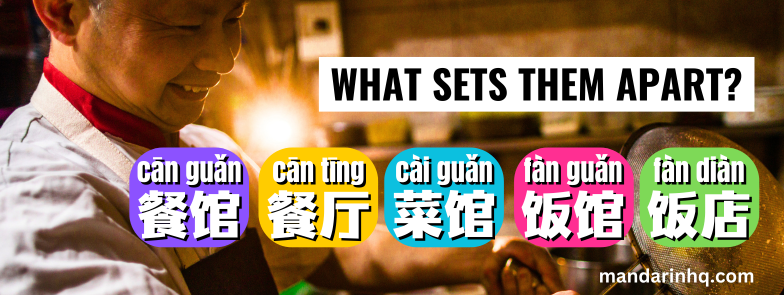Have you ever wondered what sets apart a "餐馆" from a "饭店" or how a "菜馆" differs from a "餐厅"?
Today I'll guide you through the nuances of these restaurant types, so next time you’re in China or exploring Chinese neighborhoods, you’ll know what to expect when you step into any of these eateries!
Summary Of Chinese Dining Terms: Distinguishing "餐馆," "餐厅," "饭店," "饭馆," and "菜馆" From The Video Above
Today, we’re looking at some commonly used Chinese words for "restaurant." You might have come across terms like "餐馆," "餐厅," "饭店," "饭馆," and "菜馆." But what are the differences between them? And which ones are the most common? Let’s break it down!
● 菜馆 (càiguǎn): Restaurant focusing on a variety of dishes, usually highlighting a specific cuisine.In terms of frequency, "餐馆" and "餐厅" are the most commonly used in everyday conversation. "饭馆" is also very common, especially in more casual contexts. "饭店" is used both for restaurants and hotels, depending on the region, while "菜馆" is less common and often specific to certain types of cuisine.Outro:I hope this clears up any confusion about these terms. Next time you're in China or speaking with Chinese friends, you'll know exactly which word to use.First, we have "餐馆" (cānguǎn).
"餐馆" (cānguǎn) is a general word for "restaurant" and is widely used in both formal and informal contexts.
Example Sentence:
今晚我们去那家新开的餐馆吃饭吧!
Jīnwǎn wǒmen qù nà jiā xīn kāi de cānguǎn chīfàn ba!
Let’s go to that new restaurant for dinner tonight!
Next, "餐厅" (cāntīng).
"餐厅" (cāntīng) also means "restaurant," but it can refer to both a standalone restaurant and a dining hall within a larger establishment, like a school or company.
Example Sentence:
我们学校的餐厅提供各种美食。
Wǒmen xuéxiào de cāntīng tígōng gèzhǒng měishí.
Our school dining hall offers a variety of foods.
Moving on to "饭店" (fàndiàn).
Historically, "饭店" meant "hotel," but in modern usage, it often refers to higher-end restaurants. However, in some regions, it can still mean "hotel."
Example Sentence:
这家饭店的粤菜特别有名。
Zhè jiā fàndiàn de Yuècài tèbié yǒumíng.)
This restaurant is famous for its Cantonese cuisine.
Now, let's talk about "饭馆" (fànguǎn).
"饭馆" (fànguǎn) is similar to "餐馆" and generally means "restaurant," but it often suggests a more casual or family-run establishment.
Example Sentence:
那家小饭馆的饺子非常好吃。
Nà jiā xiǎo fànguǎn de jiǎozi fēicháng hǎochī.
The dumplings at that little restaurant are very delicious.
Lastly, we have "菜馆" (càiguǎn).
Explanation: "菜馆" (càiguǎn) literally translates to "vegetable restaurant," but it refers to a place where you can order a variety of dishes, often highlighting a certain type of cuisine.
Example Sentence:
我们今晚去那家四川菜馆吧。
Wǒmen jīnwǎn qù nà jiā Sìchuān càiguǎn ba.
Let’s go to that Sichuan restaurant tonight.
Comparison and Common Usage (summarizing the differences.)
So, to sum up:
● 餐馆 (cānguǎn): General term for restaurant, very common.
● 餐厅 (cāntīng): Can mean restaurant or dining hall, quite common.
● 饭店 (fàndiàn): Often a high-end restaurant, can also mean hotel.
● 饭馆 (fànguǎn): Casual, often family-run restaurant.
● 菜馆 (càiguǎn): Restaurant focusing on a variety of dishes, usually highlighting a specific cuisine.
In terms of frequency, "餐馆" and "餐厅" are the most commonly used in everyday conversation. "饭馆" is also very common, especially in more casual contexts. "饭店" is used both for restaurants and hotels, depending on the region, while "菜馆" is less common and often specific to certain types of cuisine.Outro:I hope this clears up any confusion about these terms. Next time you're in China or speaking with Chinese friends, you'll know exactly which word to use.
You might also find these posts interesting:

